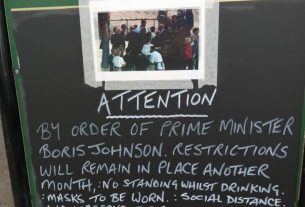The royal family are proving their worth to the government this week as troubles around the palace steal the media’s attention from a series of significant events and important stories.
Claims that the Duchess of Sussex bullied palace staff dominate today’s front pages ahead of this weekend’s US broadcast of Harry and Meghan’s Oprah Winfrey interview – as the Duke of Edinburgh’s recuperation from heart surgery plays on in the background.
The front page of today’s Metro states the “PM is drawn into ‘bully’ Meghan row” – by virtue of his cabinet secretary, Simon Case having worked two years for the royals as Prince William’s private secretary, when in 2018, Case reportedly “covered up the bullying claims”.
Conveniently for Johnson, claims about bullying at the palace have overshadowed and eclipsed a plethora of highly consequential stories that have an actual and very real impact on people’s lives.
‘A kick in the teeth’
Not least, the 1% pay rise for NHS workers that’s been described as “a kick in the teeth” for those who have fought on the frontline throughout the pandemic by MPs and unions, while the government claims it’s “the most” it can afford.
Or the deepening and ever more dangerous crisis around the Northern Ireland Protocol that has seen Loyalist terrorist groups writing to the prime minister to tell him they have withdrawn their support for the Good Friday Agreement, followed by the UK government’s unilateral decision to extend the post-Brexit grace period on checks of goods entering NI from GB.
Or the fall out from the budget, the £16 billion cut in real spending that’s rebranded Rishi ‘Santa’ Sunak as Scrooge, or indeed the accusations of “naked pork barrel politics” given 40 of the 45 towns sharing the £1 billion “levelling-up” funding are Conservative controlled.
What price silence?
Claims of bullying at the palace and a tantalising TV interview have also supplanted, rather ironically, a story of bullying in Whitehall that the taxpayer has stumped up £370,000 to silence and settle.
Because while Johnson has been “drawn into” the royal “bully” row, his government has reached an out of court settlement with Sir Philip Rutnam that kills a legal claim for constructive dismissal over Priti Patel’s bullying behaviour.
The payout – which, it is worth repeating will be paid by the taxpayer – avoids embarrassing and politically damaging details being aired at an employment tribunal at which Johnson and Patel were both expected to testify; and also contains, the Times reports, “a gagging agreement that prevents him [Rutnam] from speaking about the case.”
Value for money
The Guardian reports Rutnam – who resigned on February 29 last year – will get a £340,000 settlement, with the taxpayer also footing the bill for “a further £30,000 in costs.”
While the Home Office refused to disclose exactly how much it has paid knight of the realm Rutnam for his silence, it has insisted the amount is “value for money”.
“There is relief across government,” a source said, while the Times states Patel herself “was said to be very pleased that the dispute has been settled.”
Patel has been accused of bullying in three departments – the Home Office, the Department for International Development, and the Department for Work and Pensions (DWP). Her conduct at the DWP saw a £25,000 payout made when a lawsuit was threatened “in which Patel was named”, reminds the Guardian.
She has also claimed the scalps of other senior civil servants – including Sir Alex Allan, the prime minister’s chief adviser on the ministerial code who resigned in November after Johnson ignored his findings that the Home Secretary broke the code and had engaged in bullying behaviour – and yet she remains head of the Home Office.
Last month the FDA (the union for civil servants) launched a High Court challenge to Johnson’s decision not to sack Patel after she was found by the investigation commissioned by the Cabinet Office to have bullied staff and breached the ministerial code.
Which means even more taxpayer money will be spent on more legal proceedings against a bullying home secretary protected by a prime minister whose government can only afford “at most” a 1% pay rise for health workers.
(The taxpayer also forked out “in the region of £100,000” in November over the dismissal of former special adviser Sonia Khan, who was marched out of Downing Street by armed police on the orders of Dominic Cummings (who, we remember, received a £40,000 pay rise before he quit last year). That out-of-court settlement also meant big names in the government avoided appearing at an employment tribunal, with the Independent reporting that again, it “was even thought that the prime minister himself, as the ultimate employer of all special advisers, could be asked to testify if it reached a hearing.”)
It is also interesting to compare and contrast the coverage and scrutiny applied to Patel with that of Nicola Sturgeon – who has been condemned and faced myriad calls for her resignation over the Alex Salmond saga and speculation as to whether she had broken the ministerial code. The ongoing inquiry saw Sturgeon face an eight-hour grilling by the Scottish parliament with Labour, the Lib Dems and Conservatives all uniting to condemn her conduct and call for her to go.
Not so Patel for whom £370,000 paid to avoid scrutiny represents value for money.




